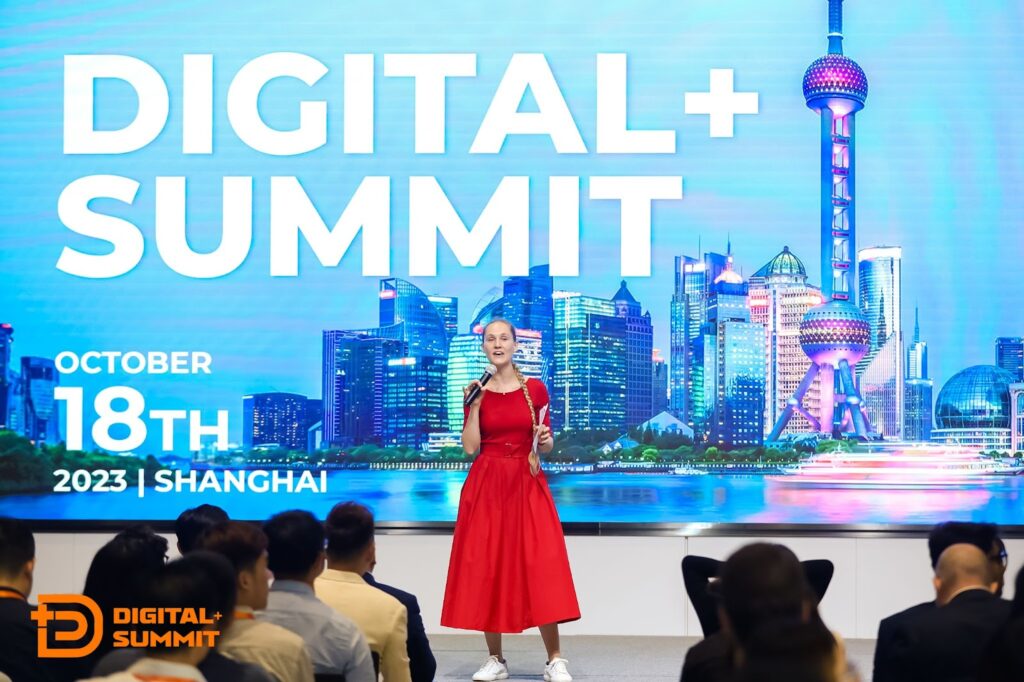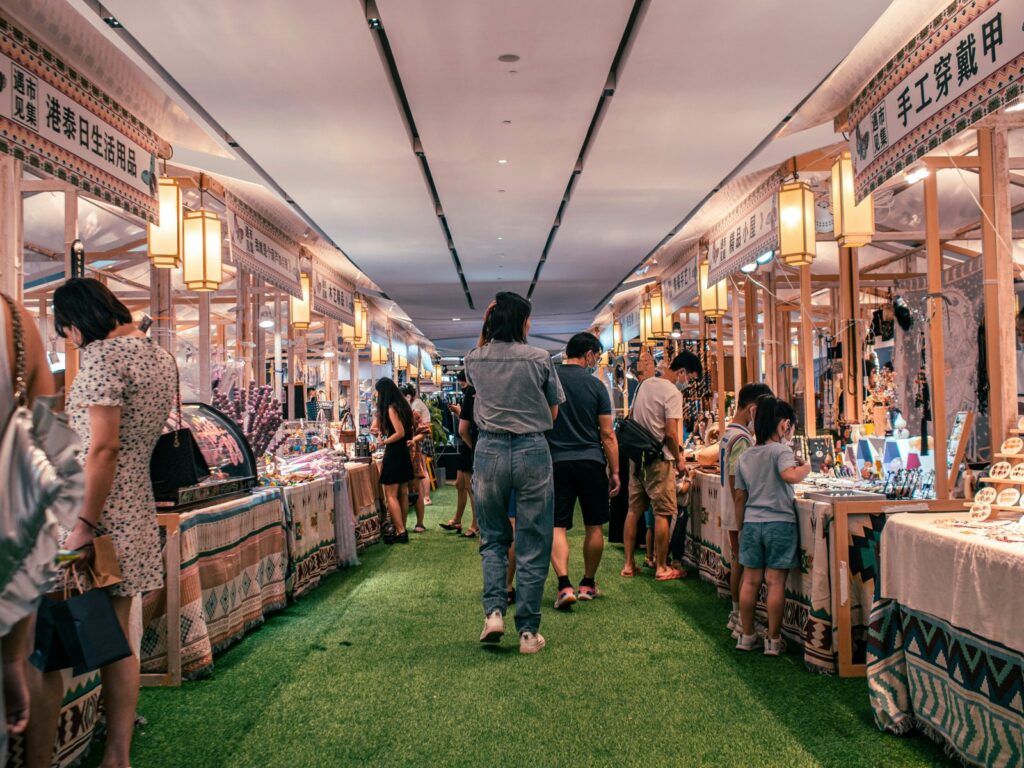Retail technology refers to digital software, platforms, and innovations that help retailers manage and optimize their operations. Typically, retail tech is used to improve the customer experience, increase efficiency and optimize profitability for retailers.
The retail landscape has undergone significant changes due to advancements in technology, reshaping customer expectations and operational practices.
For instance, the global retail technology market is projected to reach approximately $4 trillion by 2025, reflecting a compound annual growth rate (CAGR) of around 15% from 2020.
China’s retail technology, in particular, is experiencing a remarkable transformation, characterized by rapid innovation and a strong consumer focus. As of 2024, the Chinese e-commerce market is projected to reach $2.14 trillion by 2028, reflecting the country’s position as a global leader in digital retail.
This growth is fueled by major platforms such as Taobao, Tmall, JD, Pinduoduo, and Douyin, which are continuously reshaping the online shopping experience through strategic initiatives and technological advancements.
A significant trend in the retail sector is the increasing demand for immersive shopping experiences. Technologies like augmented reality (AR) and virtual reality (VR) are gaining traction in both online and offline environments.
Retailers are leveraging these tools to create interactive product presentations and virtual try-ons, catering to a consumer base that values unique shopping experiences.
The integration of social commerce on platforms such as WeChat and Douyin further enhances this trend, allowing consumers to engage with brands in more dynamic ways.
What are the Top 5 Retail Technology Trends?

What will the future of retail look like? Here are some cutting-edge technologies retailers should know about and invest in as they integrate their online and offline businesses.
#1 Retail Technology: AI (Artificial Intelligence), Generative AI, ML (Machine Learning)
Artificial intelligence (AI) and machine learning (ML) technologies have permeated various industries, including retail, where they have been extensively explored and utilized. One notable example is Amazon’s pioneering use of AI with their recommendation engine, introduced over twenty years ago.
This ML algorithm analyzes customers’ shopping history, location, and the purchasing behaviors of similar customers to provide personalized recommendations.
Moving forward, retailers must further embrace AI and related technologies to stay ahead in the evolving retail landscape.
Meanwhile, the big tech companies in China like Alibaba, Tencent, Huawei are all developing their own Large language Models (LLM) and AI ability.
Alibaba’s Taobao Wenwen launched in mid 2023 provides customized recommendation services based on users’ search history and interests. Recommendations are shared as text, picture or video responses with links to corresponding products.

Wenwen currently covers 5 main functional scenarios: helping users choose products, travel planning, life assistants, food enthusiasts’s guides, and writing materials.
Wenwen is the first time that Alibaba apply its LLM “Tongyi Qianwen” into its e-commerce platform Taobao, part of a broader rollout of the artificial intelligence-powered tool across its ecosystem. There are over 5 million users in Wenwen today, with most active users asking more than 8 questions per day.
In China, AI is being leveraged to transform urban transportation systems through smart city initiatives. One notable application is the implementation of AI-powered traffic control systems in major cities like Shanghai and Beijing.
These systems use real-time data from cameras, sensors, and connected infrastructure to analyze traffic patterns, predict congestion hotspots, and optimize traffic flow. By utilizing machine learning algorithms, these AI systems can adjust traffic signals dynamically, reroute vehicles, and provide actionable insights to city authorities for efficient traffic management.
This technology aims to reduce traffic congestion, lower emissions, and improve overall transportation efficiency, ultimately enhancing the quality of life for city residents. The integration of AI in traffic management exemplifies China’s commitment to sustainable urban development and underscores the transformative impact of artificial intelligence in creating smarter, more livable cities.
#2 Retail Technology: XR/AR/VR
XR (Extended Reality) technology is making significant strides in the retail industry, transforming the way businesses engage with customers and enhancing the overall shopping experience. XR encompasses virtual reality (VR), augmented reality (AR), and mixed reality (MR), offering a spectrum of immersive and interactive possibilities.
In retail, XR technology allows customers to virtually try on products, visualize how furniture or decor would look in their homes, or explore virtual showrooms and stores from the comfort of their own homes.
By bridging the gap between the physical and digital worlds, XR technology enables retailers to create personalized and engaging experiences that drive customer satisfaction and boost sales. Whether it’s through virtual try-on apps, AR-powered product demonstrations, or interactive virtual shopping experiences, XR technology is transforming the retail landscape by providing innovative ways for customers to interact with products and brands.
Alibaba’s Tmall Luxury Pavilion, a platform dedicated to luxury shopping, is taking the retail experience to new heights by incorporating AR technology. As part of its offerings, the platform is hosting an AR fashion show and introducing the Meta Pass, which provides exclusive digital access to a range of luxury brands, including Burberry and Bogner.
Tmall Luxury Pavilion has been at the forefront of innovation, having already implemented 3D shopping, AR and VR try-ons, digital avatars, and digital collectibles. With a successful track record spanning five years, the platform has attracted over 200 luxury brands to establish official flagship stores, forging partnerships with industry giants such as LVMH Group, Kering Group, Chanel, Hermès, and Richemont Group.
Through these endeavors, Tmall Luxury Pavilion serves as a connective bridge between luxury brands and discerning Tmall consumers, offering a seamless and immersive shopping experience.

In China, the adoption of XR technologies, including VR, is transforming education and training practices. One exemplary XR application is the integration of VR simulations in medical education at top Chinese universities and hospitals.
Through immersive VR experiences, medical students can engage in realistic surgical procedures, medical diagnostics, and patient care scenarios in a virtual environment. These simulations provide students with hands-on training opportunities, allowing them to practice complex medical procedures, refine their skills, and enhance their decision-making abilities in a risk-free setting.
By leveraging XR technologies, medical institutions in China are bridging the gap between theory and practice, offering students a cutting-edge learning experience that fosters competency and confidence in real-world healthcare settings.
This innovative use of VR in medical education exemplifies China’s commitment to leveraging XR technologies to revolutionize traditional learning paradigms and equip future healthcare professionals with the skills and expertise needed to excel in their fields.
#3 Retail Technology: Digital Payment Methods
Digital payment methods have undergone a significant transformation in the retail technology landscape, altering the way transactions are conducted and enhancing convenience for customers.
With the rise of mobile devices and advancements in secure payment technologies, retailers now offer various digital payment options to cater to evolving consumer preferences. One prevalent digital payment method is mobile wallets, such as Apple Pay, Google Pay, and Samsung Pay, which enable customers to securely store their payment information and make contactless payments using their smartphones or smartwatches.
Near field communication (NFC) technology also allows customers to tap their devices on payment terminals to complete transactions quickly and efficiently. Online payment platforms like PayPal, Alipay, and WeChat Pay have gained popularity too, providing secure and seamless payment experiences for e-commerce transactions.
These digital payment methods offer benefits such as speed, convenience, security, and often integrate loyalty programs, further enhancing customer engagement and satisfaction. As retail technology continues to advance, we can expect to see even more innovative digital payment solutions emerge, further transforming the retail payment landscape.
In May 2023, China introduced Weixin’s Palm Scan Payments system, a cutting-edge technology that enables users to make secure and convenient payments using palm recognition. Initially implemented on Beijing’s airport express train line and at Shenzhen University, the service quickly gained momentum.
By September, it was officially launched at over 1,500 7-Eleven convenience stores in Guangdong province, simultaneously expanding to power bank rental stations in select areas of Shenzhen.
The versatility of this technology became evident as it showcased its usefulness in various sectors, including transportation, fitness, retail, dining, offices, and campuses. To utilize the Weixin Palm Scan Payments service, users simply align their palm with the sensor on the palm scan device and scan the QR code displayed on the screen to register on their mobile phones.
Once registered, users can make payments by scanning their palms directly. The successful transaction triggers an instant notification on their mobile phones, indicating the deducted amount. This innovative payment solution not only streamlines the payment process but also offers enhanced security and convenience to users.

#4 Retail Technology: Automation
In 2024, retailers must prioritize increased investments in automation, leveraging technological solutions to minimize human intervention in repetitive tasks. The growing labor gaps have intensified the demand for automation across various areas of the retail industry, including warehousing, inventory management, order fulfillment, and customer-facing features like contactless payments.
With existing technology, McKinsey estimates that 52% of retail activities can be automated, leading to reduced errors, enhanced service quality and speed, improved employee productivity, and cost savings. Automation can generate 300 to 500 basis points of incremental margin, a godsend for retailers facing margin pressures.
Automation in logistics has evolved from a “nice-to-have tool” to a “value-added resource in the supply chain,” according to Cainiao Group VP and General Manager of Logistics Technology Ding Hongwei. In addition to optimizing warehouse operations, technology plays an important role in effectively handling unexpected inventory surges and processing vast amounts of unstructured data in the retail industry.
This encompasses various aspects such as demand forecasting, route optimization, and the implementation of smart packaging algorithms that enhance efficiency in package sorting and last-mile deliveries.
A prime example of this is demonstrated by Cainiao, which leverages its proprietary warehouse management system to streamline its entire value chain, encompassing first-mile pickup, sorting and distribution in warehouses, and last-mile deliveries.
By utilizing the Warehouse Operations Management System and a Traffic Management and Control System, Cainiao gains comprehensive visibility and control over inventory management.
This empowers the company with the ability to effectively manage inventory fluctuations, ensuring optimal stock levels and minimizing both overstocking and stockouts. The implementation of advanced technology allows Cainiao to optimize routes, enhancing the efficiency of delivery operations while reducing costs and ensuring timely deliveries.

#5 Retail Technology: Robotics
Robotics in the retail industry refers to the integration of robotic technologies into various aspects of retail operations, like drones, unmanned cars, etc. These robots are designed to perform tasks such as inventory management, shelf stocking, order fulfillment, customer service, and even autonomous checkout.
They can enhance efficiency, accuracy, and productivity while improving the overall customer experience. Robotics in retail is a growing trend that aims to streamline operations, reduce costs, and adapt to the evolving needs of the industry.
Tencent’s Robotics X initiative represents a significant stride in the integration of robotics within the retail technology landscape in China. Launched in Shenzhen, Robotics X aims to leverage artificial intelligence and robotics to enhance various sectors, including retail. Tencent established Robotics X as part of its broader strategy to merge AI with practical applications across different industries. The lab focuses on creating innovative solutions that bridge the virtual and physical worlds, enhancing user experiences and operational efficiencies in retail settings.
Tencent’s Robotics X is designed to provide comprehensive smart retail solutions, which include consultancy, planning, pilot operations, and deployment. By integrating AI-driven technologies, Tencent aims to streamline retail operations and improve customer engagement through personalized experiences.
In collaboration with companies like Meituan, Tencent is investing heavily in autonomous delivery vehicles and drones. This technology is particularly relevant for urban retail environments where quick delivery is crucial. For instance, Meituan has successfully conducted thousands of robotic deliveries using autonomous vehicles, showcasing the potential for robotics to enhance logistics in retail.
Why Do You Need to Implement Retail Technologies?

In retail, adopting new technologies is essential. 70% of Chinese retailers have accelerated digital transformation due to COVID-19, highlighting the need for innovation to stay competitive and meet consumer demands.
From streamlining processes and optimizing inventory management to delivering personalized shopping experiences and expanding market reach, retail technologies play a pivotal role in reshaping the retail ecosystem. For instance, according to Nature, AI-driven analytics can improve inventory accuracy by up to 30%, enabling retailers to respond more effectively to consumer demand.
The integration of technologies such as artificial intelligence, data analytics, Internet of Things (IoT), and augmented reality not only empowers retailers to gain valuable insights into consumer behavior and preferences but also allows them to create seamless omnichannel experiences that cater to the needs and expectations of today’s tech-savvy shoppers.
By leveraging retail technologies effectively, businesses can unlock new growth opportunities, drive customer engagement, and build a competitive edge in the dynamic retail landscape.
For example, retailers utilizing augmented reality have reported a 20% increase in conversion rates as customers engage with products in immersive environments.
Ultimately, these advancements pave the way for sustainable growth and long-term success, making it clear that investing in retail technology is no longer optional but essential for thriving in today’s market.
Retail Technologies Enhance Customer Experience
Retail technologies have revolutionized the way customers interact with brands and make purchasing decisions. By leveraging mobile apps, retailers can offer personalized promotions, loyalty rewards, and convenient shopping features that cater to individual preferences and browsing behaviors.
Self-checkout systems streamline the payment process, reducing wait times and enhancing convenience for shoppers. Interactive displays and virtual try-on technologies enable customers to visualize products in real-world settings, enhancing their shopping experience and reducing uncertainty about their purchases.
Personalized recommendations powered by AI algorithms analyze customer data to suggest products tailored to individual tastes, increasing the likelihood of a successful sale. By integrating these technologies seamlessly into the retail environment, businesses can create a more immersive, efficient, and customer-centric shopping experience that fosters loyalty, drives repeat business, and sets them apart in a crowded marketplace.

Retail Technologies Increase Operational Efficiency
Retail technologies play a crucial role in enhancing operational efficiency across all facets of the retail ecosystem. Automated inventory management systems leverage real-time data and analytics to optimize stock levels, prevent stockouts, and minimize excess inventory, leading to improved inventory turnover rates and reduced carrying costs.
Supply chain optimization technologies lets retailers to track shipments, monitor supplier performance, and streamline logistics operations, resulting in faster delivery times and enhanced supply chain visibility.
Advanced order fulfillment systems, such as robotic picking and packing solutions, expedite order processing, reduce fulfillment errors, and increase order accuracy. By integrating these technologies into their operations, retailers can streamline workflows, minimize operational bottlenecks, and allocate resources more effectively, ultimately driving down costs and maximizing operational performance.
Retail technologies have also changed the way customers interact with brands and make purchasing decisions. By leveraging mobile apps, retailers can offer personalized promotions, loyalty rewards, and convenient shopping features that cater to individual preferences and browsing behaviors.
In fact, retailers implementing self-checkout solutions have reported a 30% reduction in checkout times, significantly improving customer satisfaction. Personalized recommendations powered by AI algorithms analyze customer data to suggest products tailored to individual tastes, increasing the likelihood of a successful sale. Research by Netguru indicates that product recommendations can lead to a 70% increase in purchase rates, both during initial sessions and return visits.
Retail Technologies Ensure Data-driven Decision-making
In the realm of retail, data has emerged as a critical asset for informed decision-making, and retail technologies play a pivotal role in harnessing and leveraging this data effectively.
Advanced analytics tools and machine learning algorithms enable retailers to collect, analyze, and interpret vast amounts of customer and operational data, providing valuable insights into consumer behavior, market trends, and performance metrics.
By tracking key performance indicators, such as sales metrics, customer engagement levels, and inventory turnover rates, retailers can make data-driven decisions that are grounded in empirical evidence rather than intuition or guesswork.
These insights empower retailers to identify emerging trends, forecast demand more accurately, optimize pricing strategies, and tailor marketing campaigns to specific customer segments.
By leveraging predictive analytics, retailers can anticipate customer preferences, personalized shopping experiences, and proactively address potential issues before they escalate.
The integration of data-driven decision-making processes into retail operations not only enhances strategic planning and resource allocation but also fosters a culture of continuous improvement and innovation within the organization.
Retail Technologies Help Save Costs and Optimize Resources
Retail technologies are instrumental in helping businesses save costs and optimize resources through various means. One significant way in which these technologies achieve cost savings is through the automation of repetitive tasks and processes, reducing the need for manual labor and minimizing human errors.
For instance, automated scheduling systems can efficiently allocate staff based on demand fluctuations, optimizing labor costs while ensuring adequate coverage during peak hours. Predictive analytics tools can forecast inventory requirements with greater accuracy, enabling retailers to avoid overstocking and markdowns, thereby reducing inventory holding costs and maximizing profitability.
Energy management systems integrated with smart sensors and IoT devices can monitor and regulate energy consumption in stores, leading to reduced utility bills and a more sustainable operational footprint.
By leveraging retail technologies to streamline operations, eliminate inefficiencies, and make data-driven decisions, retailers can achieve significant cost savings, improve resource utilization, and ultimately enhance their bottom line.

As retailers seek to enhance their operational efficiency through technology, they also recognize the importance of customer-centric strategies that drive engagement and loyalty. In this rapidly changing landscape, thought leaders like Ashley Dudarenok play a vital role in guiding businesses toward effective digital transformation.
With her extensive expertise in China’s fast-evolving retail ecosystem, Ashley emphasizes how integrating advanced technologies not only reduces operational costs but also enriches the customer experience.
By understanding the interplay between cost optimization and customer engagement, retailers can adopt a holistic approach that leverages data-driven insights to meet consumer needs while maintaining profitability. This dual focus on efficiency and customer satisfaction is essential for navigating today’s competitive retail environment and achieving sustainable growth.
Ashley Dudarenok: Leading Retail Technology Keynote Speaker

Ashley is a thought leader in the spaces of Digital China, New Retail, and tech ecosystems. She is the author of 11 best-selling books covering Digital China, New Retail, and Tech Ecosystems. She is a professional keynote speaker on the future of retail, customer centricity, China’s tech ecosystems and evolving business models.
Ashley is regularly brought in to consult companies’ top management and boards to provide a clear vision on the future of retail, digital transformation and customer centricity based on her expert knowledge of the highly competitive fast moving Chinese market. She is acknowledged as one of the World’s Top 100 Retail Influencers by ReTHINK Retail.
Ashley also collaborated with multinational companies, such as Coca Cola, J&J, Shiseido, BMW and Disney on cutting-edge retail strategies. She is recognised as a thought leader in Chinese customer centricity, the future of retail and China leadership models by Forbes. Ashley has direct access to the up-to-date data on New Retail, Digital China, and tech ecosystems and shares up-to-date insights on the future of retail and how to implement it in their business.
Ashley’s also the founder of digital transformation consulting company, ChoZan, which offers a range of services, including learning expeditions, market research, strategy development, and digital marketing, all tailored to meet the demands of the Chinese market. \
ChoZan helps companies by arranging visits to leading customer-centric companies like Xiaohongshu (RED) and JD, providing valuable insights into how these giants prioritize and excel in customer-centricity.
ChoZan also offers comprehensive market research and strategy development services to help businesses better understand customer behavior and preferences. For more details on how ChoZan can support your business, visit ChoZan’s website.

Retail Technology – Frequently Asked Questions (FAQs)
-
What is the future of Retail Technology?
The future of retail technology is poised to be highly transformative, driven by advancements in artificial intelligence (AI), data analytics, Internet of Things (IoT), augmented reality (AR), virtual reality (VR), and other emerging technologies. They provide more Personalized and immersive experiences.
-
What is the role of AI and ML in the retail industry?
AI and ML technologies play a crucial role in the retail industry by enabling personalized recommendations for customers based on their shopping history and behavior. These technologies also help automate tasks, analyze data, and improve overall operational efficiency.
-
How can retail technology benefit my business?
Retail technology can benefit your business in multiple ways. It improves operational efficiency, streamlines processes, reduces costs, enhances customer experiences, enables personalized marketing and recommendations, provides real-time analytics for data-driven decision-making, and helps you stay competitive in the ever-changing retail landscape.
-
How can retail technology improve the customer experience?
Retail technology can improve the customer experience by providing convenience, personalization, and seamless interactions. For example, self-checkout systems, mobile apps, and online platforms offer convenience and flexibility to customers. Personalized recommendations based on customer preferences and behavior enhance the shopping experience. Technologies like AI-powered chatbots can provide instant assistance, and digital signage can engage customers with interactive content.
-
Is retail technology only for large retailers?
No, retail technology is not limited to large retailers. Businesses of all sizes can benefit from implementing retail technology solutions. Many technology providers offer scalable solutions that can be tailored to the needs and budgets of small and medium-sized retailers. Retail technology can help businesses improve operations, increase efficiency, and compete effectively in the market, regardless of their size.
-
What topics does Ashley Dudarenok specialize in as a keynote speaker?
Ashley Dudarenok specializes in topics such as the future of retail, customer centricity, and China’s tech ecosystems. She provides insights into evolving business models and digital transformation, particularly in the context of the highly competitive Chinese market.
-
How has Ashley Dudarenok contributed to multinational companies?
Ashley has collaborated with major multinational companies like Coca Cola, Shiseido, and Disney to develop cutting-edge retail strategies. Her expertise helps these companies navigate the complexities of the Chinese market and implement effective customer-centric approaches.
-
What services does Ashley’s consulting company, ChoZan, offer?
ChoZan offers a range of services including learning expeditions, market research, strategy development, and digital marketing tailored to the demands of the Chinese market. The company also facilitates visits to leading customer-centric companies like Xiaohongshu (RED) and JD.com to provide valuable insights into successful retail practices.
Book Ashley Dudarenok as your keynote speaker for cutting-edge insights that will ready your organization for the future. Contact us to have her expert analysis and global perspective at your next event.


